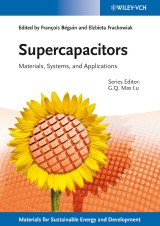Details

Supercapacitors
Materials, Systems, and ApplicationsMaterials for Sustainable Energy and Development 1. Aufl.
|
169,99 € |
|
| Verlag: | Wiley-VCH |
| Format: | EPUB |
| Veröffentl.: | 02.04.2013 |
| ISBN/EAN: | 9783527646685 |
| Sprache: | englisch |
| Anzahl Seiten: | 568 |
DRM-geschütztes eBook, Sie benötigen z.B. Adobe Digital Editions und eine Adobe ID zum Lesen.
Beschreibungen
Supercapacitors are a relatively new energy storage system that provides higher energy density than dielectric capacitors and higher power density than batteries. They are particularly suited to applications that require energy pulses during short periods of time, e.g., seconds or tens of seconds. They are recommended for automobiles, tramways, buses, cranes, fork-lifts, wind turbines, electricity load leveling in stationary and transportation systems, etc. Despite the technological maturity of supercapacitors, there is a lack of comprehensive literature on the topic. Many high performance materials have been developed and new scientific concepts have been introduced. Taking into account the commercial interest in these systems and the new scientific and technological developments now is the ideal time to publish this book, capturing all this new knowledge. The book starts by giving an introduction to the general principles of electrochemistry, the properties of electrochemical capacitors, and electrochemical characterization techniques. Electrical double layer capacitors and pseudocapacitors are then discussed, followed by the various electrolyte systems. Modelling, manufacture of industrial capacitors, constraints, testing, and reliability as well as applications are also covered. 'Supercapacitors - Materials, Systems, and Applications' is part of the series on Materials for<br> Sustainable Energy and Development edited by Prof. G.Q. Max Lu. The series covers advances in materials science and innovation for renewable energy, clean use of fossil energy, and greenhouse gas mitigation and associated environmental technologies.<br>
GENERAL PRINCIPLES OF ELECTROCHEMISTRY<br> Equilibrium Electrochemistry<br> Ionics<br> Dynamic Electrochemistry<br> <br> GENERAL PROPERTIES OF ELECTROCHEMICAL CAPACITORS<br> Introduction<br> Capacitor Principles<br> Electrochemical Capacitors<br> Summary<br> <br> ELECTROCHEMICAL TECHNIQUES<br> Electrochemical Apparatus<br> Electrochemical Cell<br> Electrochemical Interface: Supercapacitors<br> Most Used Electrochemical Techniques<br> <br> ELECTRICAL DOUBLE-LAYER CAPACITORS AND CARBONS FOR EDLCS<br> Introduction<br> The Electrical Double Layer<br> Types of Carbons Used for EDLCs<br> Capacitance versus Pore Size<br> Evidence of Desolvation of Ions<br> Performance Limitations: Pore Accessibility or Saturation of Porosity<br> Beyond the Double-Layer Capacitance in Microporous Carbons<br> Conclusions<br> <br> MODERN THEORIES OF CARBON-BASED ELECTROCHEMICAL CAPACITORS<br> Introduction<br> Classical Theories<br> Recent Developments<br> Concluding Remarks<br> <br> ELECTRODE MATERIALS WITH PSEUDOCAPACITIVE PROPERTIES<br> Introduction<br> Conducting Polymers in Supercapacitor Application<br> Metal Oxide/Carbon Composites<br> Pseudocapacitive Effect of Heteroatoms Present in the Carbon Network<br> Nanoporous Carbons with Electrosorbed Hydrogen<br> Electrolytic Solutions -<br> A Source of Faradaic Reactions<br> Conclusions -<br> Profits and Disadvantages of Pseudocapacitive Effects<br> <br> LI-ION-BASED HYBRID SUPERCAPACITORS IN ORGANIC MEDIUM<br> Introduction<br> Voltage Limitation of Conventional EDLCs<br> Hybrid Capacitor Systems<br> Material Design for NHC<br> Conclusion<br> <br> ASYMMETRIC AND HYBRID DEVICES IN AQUEOUS ELECTROLYTES<br> Introduction<br> Aqueous Hybrid (Asymmetric) Devices<br> Aqueous Asymmetric Electrochemical Capacitors<br> Tantalum Oxide-Ruthenium Oxide Hybrid Capacitors<br> Perspectives<br> <br> EDLCS BASED ON SOLVENT-FREE IONIC LIQUIDS<br> Introduction<br> Carbon Electrode/Ionic Liquid Interface<br> Ionic Liquids<br> Carbon Electrodes<br> Supercapacitors<br> Concluding Remarks<br> <br> MANUFACTURING OF INDUSTRIAL SUPERCAPACITORS<br> Introduction<br> Cell Components<br> Cell Design<br> Module Design<br> Conclusions and Perspectives<br> <br> SUPERCAPACITOR MODULE SIZING AND HEAT MANAGEMENT UNDER ELECTRIC, THERMAL, AND AGING CONSTRAINTS<br> Introduction<br> Electrical Characterization<br> Thermal Modeling<br> Supercapacitor Lifetime<br> Supercapacitor Module Sizing Methods<br> Applications<br> <br> TESTING OF ELECTROCHEMICAL CAPACITORS<br> Introduction<br> Summaries of DC Test Procedures<br> Applicatin of the Test Procedures to Carbon/Carbon Devices<br> Testing of Hybrid, Pseudocapacitive Devices<br> Relationships between AC Impedance and DC Testing<br> Uncertainties in Ultracapacitor Data Interpretation<br> Summary<br> <br> RELIABILITY OF ELECTROCHEMICAL CAPACITORS<br> Introduction<br> Reliability Basics<br> Cell Reliability<br> System Reliability<br> Assessment of Cell Reliability<br> Reliability of Practical Systems<br> Increasing System Reliability<br> System Design Example<br> <br> MARKET AND APPLICATIONS OF ELECTROCHEMICAL CAPACITORS<br> Introduction: Principles and History<br> Commerical Designs: DC Power Applications<br> Energy Conservation and Energy Harvesting Applications<br> Technology Combination Applications<br> Electricity Grid Applications<br> Conclusions<br>
Francois Beguin is Professor of Materials Chemistry at Orleans University, France. His research activities are devoted to chemical and electrochemical applications of carbon materials, with special attention to the development of nano-carbons with controlled porosity and surface functionality for applications in energy conversion/storage and environment protection. He has published over 230 papers, owns several patents, and his works have been cited over 3000 times. Beguin is the Director of two national programmes in the French Agency for Research (ANR), one on Energy Storage (Stock-E), the other on Hydrogen and Fuel Cells (H-PAC).<br> <br> Elzbieta Frackowiak is a full professor at Poznan University of Technology, Poland. She is an electrochemist, with research interests focused on energy storage/conversion. Frackowiak has more than 150 publications and 2800 citations to her name, and is Chair Elect of Division 3 (Electrochemical Energy Conversion and Storage) of the International Society of Electrochemistry.<br>
Supercapacitors are a relatively new energy storage system that provides higher energy density than dielectric capacitors and higher power density than batteries. They are particularly suited to applications that require energy pulses during short periods of time, e.g., seconds or tens of seconds. They are recommended for automobiles, tramways, buses, cranes, fork-lifts, wind turbines, electricity load leveling in stationary and transportation systems, etc. Despite the technological maturity of supercapacitors, there is a lack of comprehensive literature on the topic. Many high performance materials have been developed and new scientific concepts have been introduced. Taking into account the commercial interest in these systems and the new scientific and technological developments now is the ideal time to publish this book, capturing all this new knowledge. The book starts by giving an introduction to the general principles of electrochemistry, the properties of electrochemical capacitors, and electrochemical characterization techniques. Electrical double layer capacitors and pseudocapacitors are then discussed, followed by the various electrolyte systems. Modelling, manufacture of industrial capacitors, constraints, testing, and reliability as well as applications are also covered. 'Supercapacitors - Materials, Systems, and Applications' is part of the series on Materials for<br> Sustainable Energy and Development edited by Prof. G.Q. Max Lu. The series covers advances in materials science and innovation for renewable energy, clean use of fossil energy, and greenhouse gas mitigation and associated environmental technologies.


















